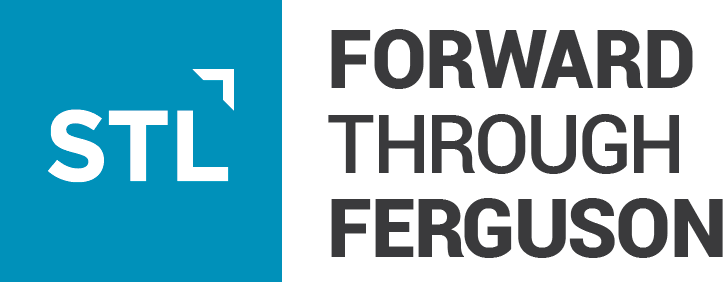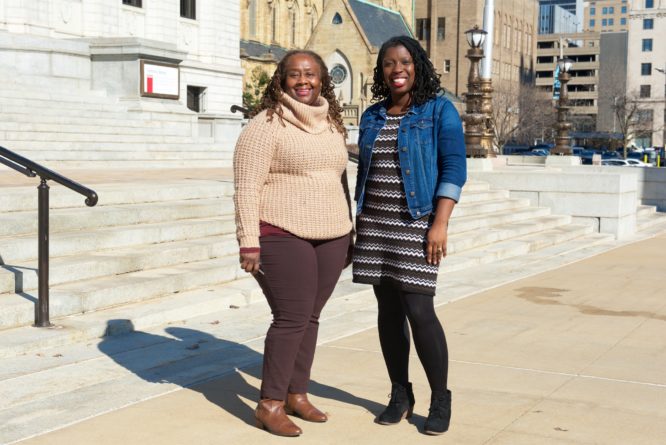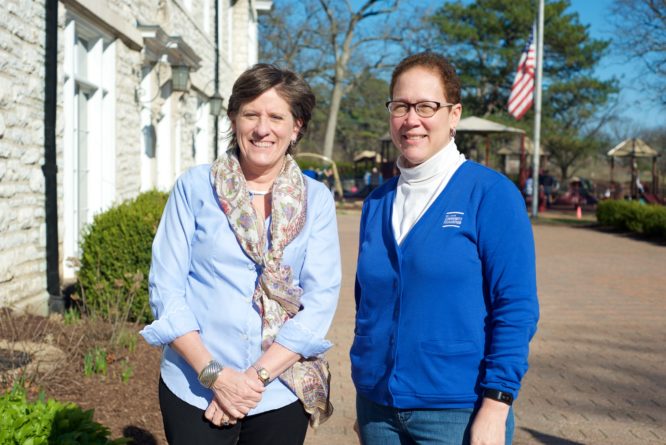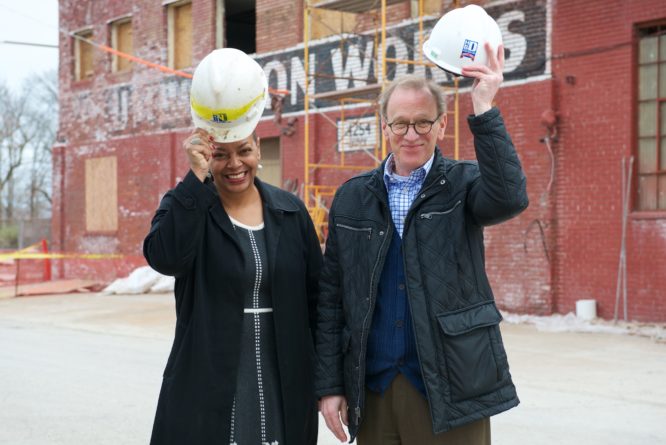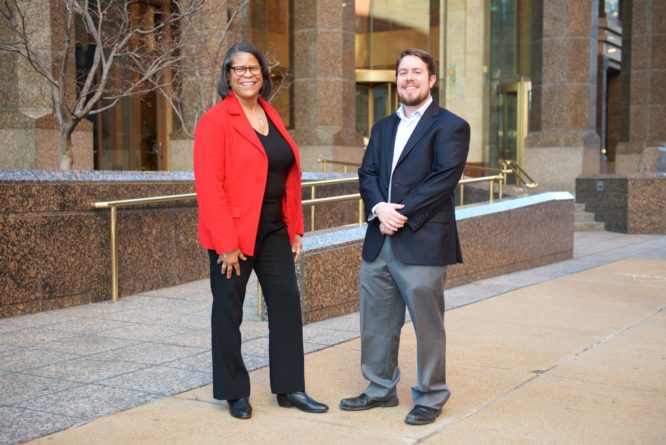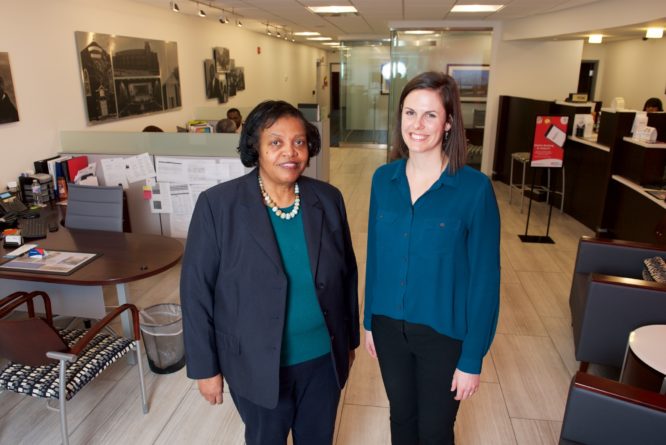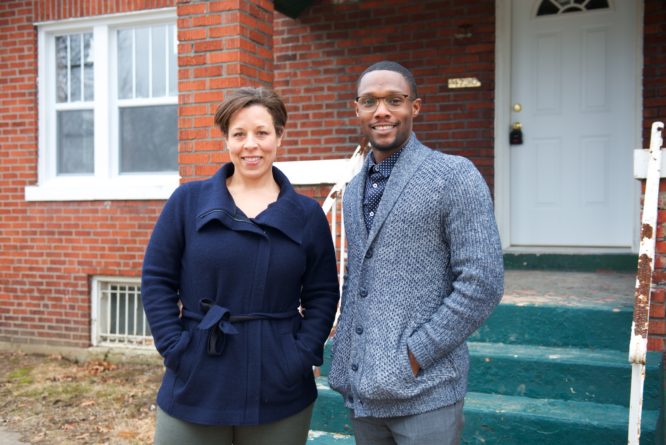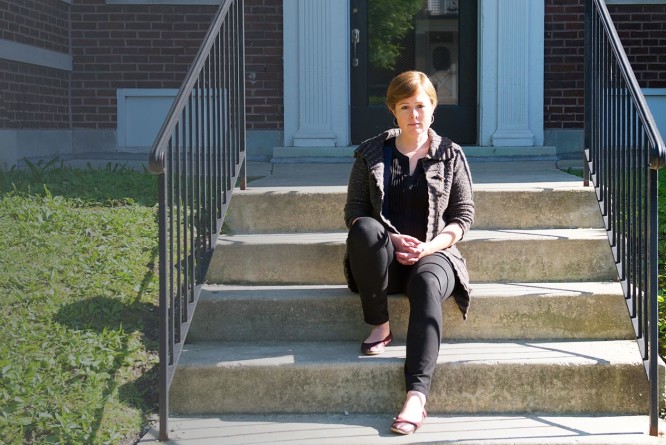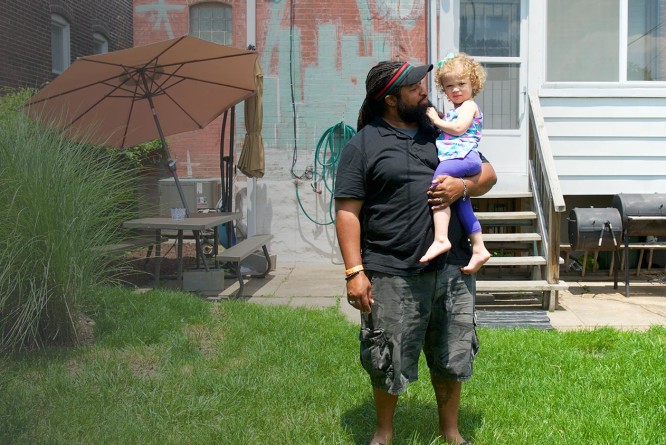Joshua Jones – #FiveYearsLater #STL2039
Community stories marking the five-year milestone after the killing of Michael Brown Jr. and the Ferguson uprising. Residents reflect on where we’ve been, where we are, and where we’re going.
Vetta and Riisa – #STL2039
Sharing the visions of St. Louis residents for a future St. Louis—in 2039—where Racial Equity is the reality and what they’re doing to achieve it today. #STL2039
Amelia and Maria – #STL2039
Sharing the visions of St. Louis residents for a future St. Louis—in 2039—where Racial Equity is the reality and what they’re doing to achieve it today. #STL2039
Erica and Serena – #STL2039
Sharing the visions of St. Louis residents for a future St. Louis—in 2039—where Racial Equity is the reality and what they’re doing to achieve it today. #STL2039
David and Rachel – #STL2039
Sharing the visions of St. Louis residents for a future St. Louis—in 2039—where Racial Equity is the reality and what they’re doing to achieve it today. #STL2039
Stacey and Bob – #STL2039
Sharing the visions of St. Louis residents for a future St. Louis—in 2039—where Racial Equity is the reality and what they’re doing to achieve it today. #STL2039
Tishaura and Ellen – #STL2039
Sharing the visions of St. Louis residents for a future St. Louis—in 2039—where Racial Equity is the reality and what they’re doing to achieve it today. #STL2039
Val and Greg – #STL2039
Sharing the visions of St. Louis residents for a future St. Louis—in 2039—where Racial Equity is the reality and what they’re doing to achieve it today. #STL2039
Jackie and Elisabeth — #STL2039
This is part of the #STL2039 Action Plan storytelling series in partnership with Humans of St. Louis. Jackie Hutchinson: I am the Board President of Consumers Council of Missouri. CCM’s mission is to educate and advocate for the collective interests of consumers through leadership and partnerships on issues such as utility rates, personal finance, health…
Stephanie and Neal — #STL2039
Sharing the visions of St. Louis residents for a future St. Louis—in 2039—where Racial Equity is the reality and what they’re doing to achieve it today. #STL2039
Scott
I was born and raised in Ferguson. My grandfather came here in 1920. I still get emotional because it’s my hometown. I couldn’t believe what was going on on many different levels. We worked so hard to make this a good town. I say “we” — the entire community. And to see what was going…
What does it take to find a home?
It’s the summer of 2002. Fredica M., a St. Louis native who’s moved back to the Midwest after spending some time in California, is a 25-year old mother renting an apartment in South City. She’s glad to be back in her hometown, and expecting her third child. What she isn’t expecting is becoming homeless. When…
Ginger
Entrepreneurs are generally inherently disruptive because they’re trying to fix a problem and they’re trying to change whatever the status quo is around that problem. That’s what entrepreneurs do best. The kinds of challenges that face our community as a region, race-wise, require disrupting the norms.
Why do you live where you live?
Deciding where to make your home is challenging enough when you’re familiar with where you’re moving. For those who transplant to St. Louis from an entirely different city, state, or country even, the advice of contacts in your soon-to-be-local area can provide valuable insights
Support early career development
Ask your employer about opportunities that may exist to intentionally expose students to your industry via internships, mentoring or other volunteer programs. Encourage your employer to develop relationships with local schools to expand opportunities for young people in diverse industries.
Use public transit
When possible use public transit as an alternative to commuting or exploring the region. Participate in existing programs intended to increase ridership; visit Citizens for Modern Transit for more information on trying our local transit system: https://cmt-stl.org/programs/cmts-try-ride-program/.
Support affordable housing
Support affordable housing in your neighborhood.
Support financial empowerment
Invest in programs and organizations positioned to help others build financial capacity.
Invest in a child’s future
Make a financial investment in a child’s savings account.
Support increased access to care
Contact your local state legislator to express your support for Medicaid expansion. Join local or state advocacy organizations to get involved.
Summary of Terms
Apprenticeship A combination of on-the-job training and related instruction in which workers learn the practical and theoretical aspects of a highly skilled occupation. Source: U.S. Department of Labor, https://www.dol.gov/dol/topic/training/apprenticeship.htm Asset-Building Strategies that focus on the long-term development of individuals, families, and communities and that promote the increase of financial and tangible assets, such as savings,…
Identify Job Training Best Practices
A designated task force appointed by the Department of Economic Development’s Workforce Development Division shall identify critical attributes of job training programs that shall be used: As criteria for guiding current job training organizations; As standards to evaluate the success of those programs; and As criteria for awarding priority grant funding from local foundations and…
Implement Work-Based Learning Opportunities
Industry organizations (e.g., employers, unions) shall consider more work-based learning and apprenticeship opportunities as a workforce training approach. (e.g., LaunchCode and Building Union Diversity (BUD)).
Preferentially Fund Job Training Programs that Show Impact
Funding for job training programs throughout the state shall be prioritized for those programs that successfully serve, place, and retain job seekers as measured by dedicated performance metrics.
Modify Procurements Systems to Encourage Hiring of Targeted Employees
Amend the existing state and local contract procurement scoring systems to create a preference for employers offering new employment for targeted employees (e.g.,the hard-to-employ).
Expand Funding for Job Training and Wage Support Programs
Expand funding for and access to job training and wage support programs for new hires (e.g., St. Louis Agency of Training and Employment [SLATE’s] program using Department of Labor [DOL] funds).
Create Pathways for Lower Skilled Employees
Modify incentive programs for employers to prioritize those that have internal career ladders creating clear pathways to higher skilled jobs for lower skilled employees.
Assess Tax Incentives to Ensure that They Serve the Intended Population
State and local incentives shall be analyzed to ensure that they are ultimately serving the intended target population. The recommendations of the Tax Credit Accountability Review Commission (a body of private citizens selected to make recommendations to the legislature) shall be reviewed and given consideration.
Launch Best Practice-Driven Job Training Programs
Expand and incentivize transitional job programs containing confirmed critical attributes to be identified by a designated task force appointed by the Department of Economic Development’s Workforce Development Division to serve a greater number of employment-ready individuals including those who are TANF recipients, long-term unemployed, and at-risk youth.
Teach Financial Literacy to Section 8 Housing Beneficiaries
Provide Section 8 housing beneficiaries with financial literacy and technical assistance in asset-building so that they can become permanent homeowners.
Build a Poverty-to-Professional Model for Youth Serving Organizations
Missouri youth-serving organizations shall advocate for the development of a model that empowers low-income young adults to go from poverty to professional careers in an accelerated timeframe.
Evaluate Job Training Success and Award Funding Accordingly
Incorporate the number of disconnected youth enrolled and graduated from job training programs with significant success in job placement and earnings as a metric in the performance evaluations of youth-serving organizations receiving public dollars and grant funds from local foundations in the St. Louis metropolitan region.
Prioritize Tax Incentives for Youth-Serving Job Programs
Modify existing tax credit contribution programs to prioritize paid stipend programs aimed at connecting at-risk, disconnected youth (those under the age of 25 who are neither employed nor in school but who are ready for employment) with internships, apprenticeships, or mentoring programs with private business.
Expand the City of St. Louis Housing Trust Fund
The City of St. Louis should lift the $5 million cap on its Housing Trust Fund
Expand the Statewide Housing Trust Fund
Expand the statewide Missouri housing trust fund (HTF) program by doubling the current real estate transaction filing fee
Align Funding to Build Capacity of CDCs
Engage area funders, non-profits, financial institutions, and private sector entities to align resources and provide financial support to encourage collaboration between community development corporations (CDCs) and build their capacity.
Encourage CDCs to Collaborate or Merge
In order to improve their professional skills and capacities, community development corporations (CDC) shall collaborate or, when possible and appropriate, merge.
Prioritize Transit-Oriented Development
Prioritize mixed-use, mixed-income, right sized development near rail transit through changes in zoning, financial incentives for developers, and transit benefits for residents of developments. Prioritize developments for the underserved in the North and South St. Louis region.
Institute Fair Housing Protections
Create fair housing protections that prohibit discrimination by source of income for the entire State of Missouri.
Develop and Implement an Economic Inclusion Infrastructure
Create and implement an economic inclusion infrastructure in industries that supports business’ growth strategies and aids them in attaining their profit goals by promoting workforce inclusion (e.g. Construction, Manufacturing, and others).
Launch an Employer Grading System for Economic Mobility
Endorse the Better Business Bureau-like consumer – facing rating system proposed by the Commission in the area of Racial Equity and Reconciliation and add to it economic mobility factors that should be monitored (e.g. employability, opportunity for promotion, promotability, presence of career path, income).
Implement a Statewide M/WBE Program
Establish a statewide program for Minority/Women’s Business Enterprises (M/WBEs) with outcomes measures that incorporate capacity building, mentoring, and education with respect to the state and local procurement system.
Encouraging Use of Public Transportation
Incentivize residents of St. Louis City and County to try transit by: Implementing a ridership program that educates individuals on how to use the system for work or education trips and demonstrates the possibilities for job access and educational trips and potential personal cost savings; Improving bus tracking to enhance the ease with which bus…
Identify Priority Transportation Projects for the St. Louis Region
Identify agreed upon priority transportation project(s) for the St. Louis region (e.g., extending MetroLink on the proposed North-South corridor, implementing Bus Rapid Transit) in order to elevate the importance of key projects for the region and make tangible the need and potential benefits of transit.
Develop a State Supported Funding Plan for Public Transit
Develop a State supported funding plan for public transit in order to fill a significant funding deficit when seeking federal dollars for transit capital projects requiring matching funds.
Expand Funding for Public Colleges that Serve Disadvantaged Students
Establish a funding pool in the form of a competitive grant program to encourage public 2- and 4-year colleges to develop disadvantaged students that are well prepared for and matched to labor market demand in key sectors, as defined through partnership with the area business community, by providing more resources based on academic and employment…
Support Federal “Gainful Employment” Regulations
Support federal regulation of for-profit colleges via the U.S. Department of Education final rules focusing on “gainful employment” that prevents students from being buried in debt, sets more rigorous accountability, provides transparency about student outcomes and encourages income-based repayment plans.
Enhance Collaboration Between Educational Institutions and Employers
Enhance and expand collaboration between educational institutions and employers statewide by: Establishing a regional intermediary to ensure greater public-private collaboration in assessing workforce needs and communicating those needs with K-12 institutions, job training programs, and post-secondary education institutions; Developing a regional strategy for aligning educational programs to workforce needs that has clearly established indicators to…
Use Federal Funds in Strategic Maximally Impactful Ways
St. Louis County shall partner with the Department of Housing and Urban Development to develop an approach that directs Community Development Block Grants to be more impactful
Stabilize Middle-Market Neighborhoods
Develop a regional strategy that actively attempts to stabilize middle-market neighborhoods and that emphasizes the health and well being of existing residents (e.g., Baltimore’s Healthy Neighborhoods program).
Create a St. Louis County Land Bank
St. Louis County shall create a land bank with a dedicated source of revenue and authority to engage in strategic land reutilization
Build Healthy, Affordable Housing
Support the Missouri Housing Development Commission’s 2015-16 Qualified Allocation Plan (QAP) as it references unit sizes, investment of LIHTC, and workforce housing namely with respect to: Limiting applications to fifty (50) affordable units (with exceptions mentioned in the QAP) Prohibiting new construction and conversion in locations where the total publicly subsidized housing units (as defined…
Enact Inclusionary Zoning Ordinances
Enact inclusionary zoning ordinances to promote access to affordable housing for low-income individuals
Implement a State Section 3 Hiring Program
Create a state complement to the Federal Section 3 hiring program, which requires developers to make employment available to low and very-low income residents of the community in which the development is located.
Implement Earned Income and Child Tax Credits
Implement a refundable state earned income tax credit (EITC) and child tax credit (CTC), set at a proportion of the federal credit.
Encourage Savings With Tax-Refund Matching
Institute a match of taxpayers’ savings deposits made during tax time. Directly deposit matching funds into taxpayers’ savings vehicles.
Raise Awareness of Development Accounts
Develop a rigorous plan, drawing on best practices, that leverages schools, social services systems, and other well-positioned partners in order to encourage the multigenerational impact of development accounts.
Create Individual and Family Development Accounts
Provide progressive Individual Development Accounts (IDAs) and Family Development Accounts (FDAs) offered statewide by means of a dedicated funding stream from the state. Additional potential funding sources include: Using the Community Reinvestment Act to provide banks with credit for funding development accounts; Offering corporate tax breaks for contributions to development accounts; Redirecting unclaimed savings account…
Empowerment Centers
Identify empowerment centers throughout the St. Louis region to concentrate financial services that provide community development banking and multigenerational financial education (e.g., Prosperity Connection).
Invest in High Functioning CDFIs
Invest in high functioning Community Development Financial Institutions (CDFIs) to support community- based investments, financial literacy, increased banking, and access to financial tools designed to promote economic mobility. Fund financial education initiatives through: Public: Neighborhood Assistance Program (NAP), Community Development Block Grants (CDBGs), municipal grants, etc. Private: Corporate grants, innovation and technological hubs, volunteers, etc….
Build the Capacity of CDFIs
Banks shall strengthen and secure additional funding to build the capacity of Community Development Fund Institutions (CDFIs) to remove barriers keeping many individuals from engaging with traditional banking infrastructure (e.g., no credit check or lowered credit check standards for account openings; second chance checking; credit-builder products; lower minimum balance requirements, etc.).
Embed Public Banking Models into Community Development Financial Institutions (CDFIs)
Incorporate the critical attributes embedded in public banking models into Community Development Financial Institutions (CDFIs) to advance a more equitable economy by namely: Lending to banks with better practices of equitable investing; and Subsidizing interest rates for small businesses, students, and homebuyers Providing local business with greater access to credit Augmenting the lending capacity of private…
Strengthen the Community Reinvestment Act
Regulators shall strengthen the Community Reinvestment Act (CRA), which was designed to help financial institutions meet the credit needs of their community, by: Vigorously enforcing Equal Credit Opportunity Act (ECOA) and fair housing laws in instances where lending discrimination is believed to exist. Enforcing antitrust laws especially with respect to mergers that could lead to…
End Predatory Lending
End predatory lending by changing repayment terms, underwriting standards, collection practices and by capping the maximum APR at the rate of 36%.
Protect the Rights of Workers to Organize
Protect the right of workers to organize and collectively bargain.
Protect Rights of Local Government
Protect local government’s ability to innovate above the minimum policy standards maintained by the federal or state government to meet the special needs of their community.
Raise the Minimum Wage
Raise the minimum wage to $15/hr.
Create Universal Child Development Accounts
Expand the current scope of the MOST 529 Matching Grant Program so it is used as a platform for progressive universal Child Development Accounts that are: statewide and automatic (opt-out).
Increasing Enrollment on the ACA Marketplace
Increase insurance coverage and access for everyone by enrolling more people in the ACA marketplace.
Provide Gap Coverage
Until Medicaid is expanded, preserve and enhance funding for outpatient care and medications for individuals in the coverage gap (e.g. Gateway to Better Health Demonstration Project).
Expand Medicaid Eligibility
Expand eligibility for Medicaid to 138% of the federal poverty level (or an annual income of $32,913 for a family of four) so that Missouri can take full advantage of federal funds available to meet the health needs of Missourians.
Ensuring Robust Minority Participation in the Job Market
The expert testimony, research, scholarship, and lived experience collected by the Commission revealed the following: Federal Reserve economists conducted an analysis of factors impacting per capita income growth and the growth of metropolitan areas at large for nearly 120 metropolitan areas throughout the U.S. as part of a report for the Fund for Our Economic…
Prioritizing Youth-Focused Job Creation and Training
The expert testimony, research, scholarship, and lived experience collected by the Commission revealed the following: On a national scale, employment rates showed a ‘Great Age Twist’ between 2000 and 2011. Individuals under age 54 were less likely to be working in 2011 than in 2000, while those 55 and over were more likely to be…
Bolstering Employer-Educator Collaboration
The expert research, scholarship, and testimony of lived experience collected by the Commission revealed the following: According to economist and workforce development expert Harry Holzer, community colleges provide the majority of job training in the U.S. (Holzer, 2013). Studies have found that successful job training programs involve educators collaborating with employers to design curricula (Eyster,…
Enhancing Access to Transportation
The expert testimony, scholarship, and accounts of lived experience collected by the Commission revealed the following: As stated by the Transportation Equity Caucus, “Transportation is a critical link to opportunity, connecting people to jobs, schools, affordable housing, health care, grocery stores, and more. For many Americans, mobility can make all the difference in their ability…
Optimizing Existing Housing Support
The expert testimony, research, scholarship, and lived experience collected by the Commission revealed the following: The nation is facing a housing crisis (Desmond, 2015). The number of market-rate housing units affordable for lower-income families has decreased substantially (Poethig et al., 2015). In 2013, St. Louis City had 21 market-rate units available per 100 extremely-low income…
Realigning Incentives and Funding to Improve Job Training and Creation
Realigning Incentives and Funding to Improve Job Training and Creation The expert testimony, research, scholarship, and lived experience collected by the Commission revealed the following: Federal Reserve economists conducted an analysis of factors impacting per capita income growth and the growth of metropolitan areas at large for nearly 120 metropolitan areas throughout the U.S. as…
Building Equity through Enhanced Access to Banking
The expert testimony, research, scholarship, and lived experience collected by the Commission revealed the following: As stated by researcher Martha Beard of the Federal Reserve Bank of St. Louis: “The word unbanked is an umbrella term used to describe diverse groups of individuals who do not use banks or credit unions for their financial transactions….
Ensuring Communities’ Ability to Advocate for Equity
The expert testimony, research, scholarship, and lived experience collected by the Commission revealed the following: In July 2015, Governor Jay Nixon vetoed HB 722, a bill that would have, among other things, prevented cities from raising employment benefits above state and federal standards (Missouri House of Representatives, 2015). Governor Nixon noted: “House Bill No. 722…
Ending Poverty
The expert testimony, research, scholarship, and lived experience collected by the Commission revealed the following: Federal Reserve economists conducted an analysis of factors impacting per capita income growth and the growth of metropolitan areas at large for nearly 120 metropolitan areas throughout the U.S. as part of a report for the Fund for Our Economic…
Promoting Asset Building
The expert testimony, research, scholarship, and lived experience collected by the Commission revealed the following: Research shows that increasing income for low-income families does not always increase generational wealth or reduce poverty (Shapiro et al., 2013). Income is often used as a measure of poverty; however, it does not provide as adequate a measure of…
Increasing Access to Care
The expert testimony, research, scholarship, and lived experience collected by the Commission revealed the following: Adults with insurance are more likely to have a usual source of care and access to preventive care (Ayanian et. al., 2000). Insured adults are therefore more likely to be up-to-date with their immunizations, more likely to receive cost-effective care,…
Molly
Escaping the vicious cycle of economic strife is a struggle at the crossroads of health, employment, education, housing and finances. Families and individuals whose lives hover at the edge of financial stability are devastated when faced with an unexpected or unmanageable financial set back and often never recover. Predatory lending practices shamelessly prey upon people when they are at their most vulnerable.
Combating Racism with Empathy
The Commission’s charge was to address the underlying root causes that led to the unrest in the wake of Michael Brown Jr’s death. Race is inherent in every root cause. Eliminating existing disparities for racial and ethnic populations is a fundamental goal of the calls in this report.
